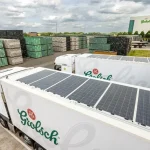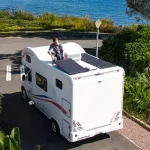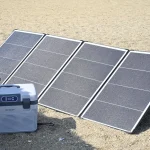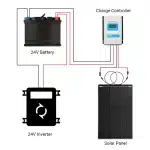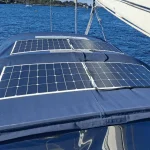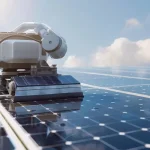When it comes to outdoor solar panels, an IP67 waterproof rating is essential. After all, solar panels are designed to withstand harsh weather conditions, including rain, snow, and extreme temperatures. That’s why many manufacturers have turned to the International Protection Code (or IP Code) to indicate the level of protection their products offer.
The IP Code has two numbers, and in the case of solar panels, the second number is the one that matters most. This number ranges from 0 to 9 and indicates the level of protection against the ingress of water. A rating of 0 means no protection, while a rating of 9 means the product is protected against powerful jets of water.
In this blog post, we’ll focus on the IP67 waterproof rating and why it’s important for solar panels.
What Does IP67 Waterproof Rating Mean?
The IP67 waterproof rating is a relatively high level of protection against the ingress of water. The first number (6) indicates that the product is completely protected against dust, while the second number (7) indicates that the product can be submerged in water up to a meter deep for 30 minutes without any harm.
So, if a solar panel has an IP67 waterproof rating, it can withstand heavy rain, splashing, and even temporary immersion in water without any damage. This makes IP67-rated solar panels ideal for outdoor use in wet and humid conditions, such as near the ocean or in areas with frequent rain.
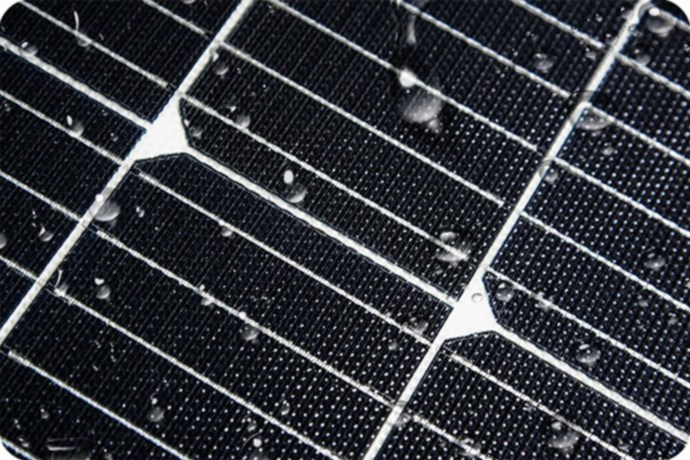
Why Is IP67 Waterproof Important for Solar Panels?
Solar panels are typically installed in outdoor environments, where they are exposed to various weather conditions. Rain, snow, and humidity can all affect the performance and lifespan of a solar panel. That’s why waterproofing is crucial to ensure the panel can operate safely and efficiently. An IP67 waterproof rating means that a solar panel can withstand even the harshest conditions, without any negative impact on its performance. This makes it an ideal choice for those who live in areas with frequent rain or high humidity, as well as for those who use solar panels in marine environments, such as boats or yachts.
What Are the Benefits of an IP67 Waterproof Rating?
An IP67 waterproof rating offers several benefits for solar panels, including:
- Increased Durability: Solar panels with an IP67 rating are built to withstand harsh weather conditions, ensuring they last longer and require less maintenance.
- Enhanced Performance: A waterproof solar panel can operate efficiently even in wet conditions, ensuring consistent power output and higher energy yields.
- Greater Versatility: IP67-rated solar panels can be used in a wide range of applications, including marine and outdoor environments, without any worries about water damage.
- Better Safety: Waterproof solar panels are safer to use in wet environments, as they are less likely to short-circuit or cause electrical hazards.
- Cost Savings: By using an IP67-rated solar panel, you can avoid the cost of repairs or replacements due to water damage, ensuring a higher return on investment.
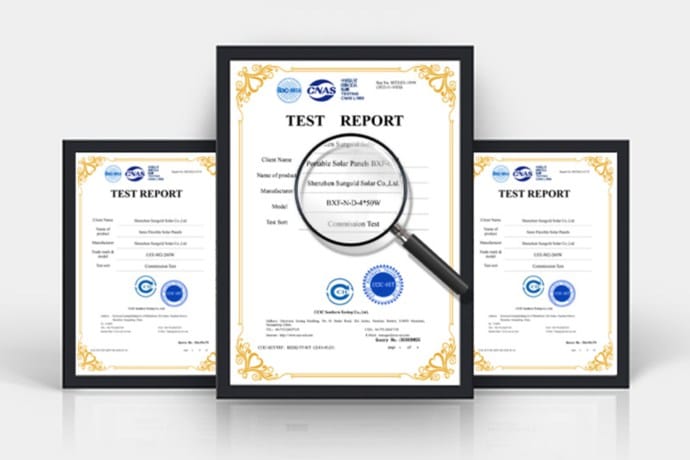
Importance of Solar Panel Waterproof Ratings
While it is true that solar panels need to be able to withstand outdoor use, the waterproof rating of a solar panel is very important for its long-term durability and performance.
Solar panels are designed to convert sunlight into electricity, but they also have to withstand exposure to the elements, such as rain, snow, and humidity. If water enters the solar panel and comes into contact with the electrical components, it can cause damage or even short-circuit the panel, rendering it useless.
Therefore, the waterproof rating of a solar panel is a critical factor in determining how well it will hold up to outdoor use. It measures the level of protection the panel has against water ingress and is typically indicated by an IP (Ingress Protection) rating.
For outdoor use, it is recommended to choose a solar panel with a high IP rating to ensure that it will remain fully functional and safe, even in harsh weather conditions. While other factors such as durability, efficiency, and temperature tolerance are also important, a solar panel’s waterproof rating should not be overlooked when selecting a panel for outdoor use.
How to choose solar panels with IP67 waterproof?
To choose solar panels with an IP67 waterproof rating, it is advisable to carefully review product specifications provided by reputable manufacturers. Look for clear and explicit information indicating the IP rating, ensuring it is IP67 compliant.
Additionally, consider the intended application and environmental conditions where the solar panels will be installed. If the solar panels are to be used in wet or humid environments, an IP67 rating provides an extra layer of protection against water-related damage, making it a suitable choice for outdoor installations, marine applications, and other scenarios prone to moisture exposure.
For example, if you like RV camping and are exposed to the outdoor environment for a long time, then the 100w flexible panel installed on the roof should have an IP67 waterproof rating to avoid affecting the output power of the components. You can completely trust us. Sungold provides cutting-edge off-grid and on-grid solutions to harness solar energy and provide reliable and sustainable energy. Our weatherproof solar panels feature IP67 or IP68 waterproof protection and durable construction, designed to ensure optimal performance in even the harshest weather. Explore our exquisite collection of solar panels and embrace a greener future!
IP67 Waterproof vs. IP68 Waterproof
When comparing the IP67 waterproof rating with the IP68 waterproof rating, it’s essential to understand the key differences between the two. While both ratings indicate high levels of water resistance, there are some distinctions that influence their performance in specific conditions.
IP67 Waterproof Rating:
IP67-rated solar panels offer complete protection against dust ingress, preventing any solid particles from entering the panel’s interior.
These panels can withstand immersion in water up to a depth of 1 meter for up to 30 minutes without sustaining damage.
IP67-rated solar panels are ideal for applications where exposure to rain, moisture, or occasional water splashes is expected.
IP68 Waterproof Rating:
IP68-rated solar panels provide the same level of protection against dust ingress as IP67-rated panels, ensuring no solid particles can compromise the panel’s functionality.
Additionally, IP68-rated panels offer an even higher level of water resistance, capable of withstanding immersion in water beyond 1 meter depth for longer durations.
IP68 waterproof solar panels are well-suited for more extreme conditions, such as underwater installations, continuous submersion, or scenarios where the solar panels may face prolonged exposure to water and moisture.
The choice between IP67 and IP68 waterproof ratings largely depends on the specific requirements of the solar panel installation and the anticipated environmental challenges. If the installation site is subject to occasional water exposure or moisture, IP67 waterproof solar panels are likely sufficient to provide reliable protection.
However, for more demanding conditions that involve continuous submersion or prolonged exposure to water, opting for IP68 waterproof solar panels can offer enhanced durability and long-term performance assurance.
Ultimately, consulting a reputable solar panel manufacturer or industry expert can provide valuable insight. Sungold offers solar panels with waterproof ratings, including IP67 waterproof solar panels as well as IP68 waterproof solar panels. Users can choose according to their needs and get professional advice.
FAQ:
Q: Is There a WaterproofSolar Panel?
A: Yes, Sungold waterproof solar panels are available. Waterproofing is an essential feature of solar panels as they need to withstand outdoor conditions, including rain and humidity. Most solar panels are designed with a protective layer that makes them waterproof and moisture-proof, such as the IP67-rated hi-power series of portable solar panels that can generate electricity even in humid environments.
However, it’s worth noting that while the solar panels themselves are waterproof, the electrical connections and wiring may require additional protection to ensure their safety and longevity. Or you can choose an IP68 waterproof MC4 connector for protection
Q: Can Solar Panels Survive Rain?
A: As far as flexible solar panel performance goes, rainy weather shouldn’t be an issue as most quality flexible solar panels are made from durable materials that resist water damage and are protected by a waterproof layer to keep the interior the normal operation of the component. Solar panels are safe. What’s more, rainwater can even help clean the panels, removing dirt and debris that may have accumulated over time.
However, it is important to ensure proper installation to prevent leaks or damage to electrical connections. Regular maintenance helps ensure the long-term performance of your solar panels, even in rainy conditions.


